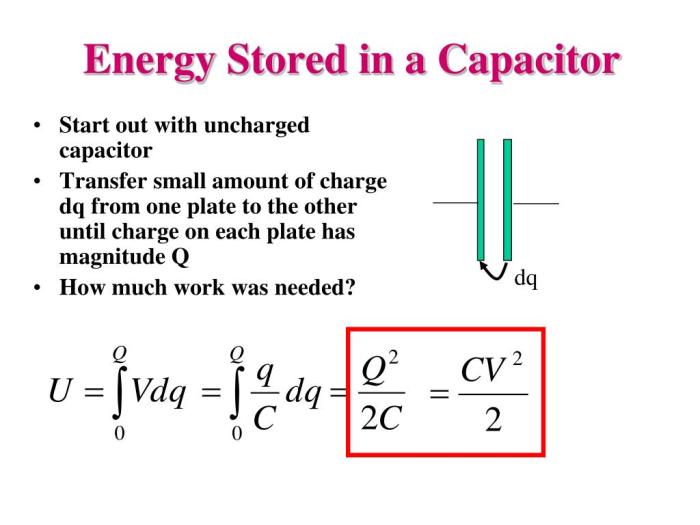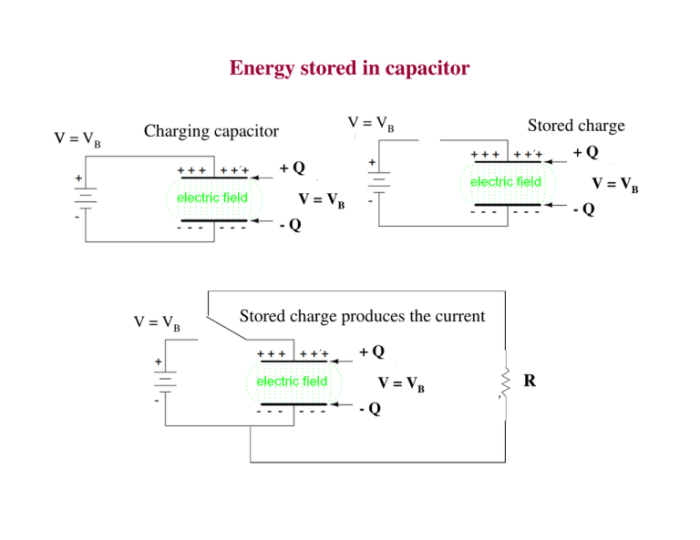Find the energy u0 stored in the capacitor. – Embarking on a journey to understand the energy stored in capacitors, this comprehensive guide delves into the intricacies of this fascinating topic, providing a clear and authoritative exploration of the concepts, applications, and design considerations surrounding energy storage in capacitors.
Capacitors, ubiquitous components in electronic circuits, possess the remarkable ability to store electrical energy, making them essential for a wide range of applications. Understanding the principles governing energy storage in capacitors is crucial for harnessing their full potential and optimizing their performance.
Energy Stored in a Capacitor: Find The Energy U0 Stored In The Capacitor.

Capacitors are electrical devices that store energy in an electric field. The amount of energy stored in a capacitor is determined by its capacitance and the voltage across it.
The mathematical formula for calculating the energy stored in a capacitor is:
U0 = 1/2
- C
- V^2
where:
- U0 is the energy stored in the capacitor in joules
- C is the capacitance of the capacitor in farads
- V is the voltage across the capacitor in volts
The factors that affect the energy stored in a capacitor are its capacitance and the voltage across it. The greater the capacitance, the more energy the capacitor can store. The greater the voltage, the more energy the capacitor can store.
Capacitance and Energy Storage
Capacitance is the ability of a capacitor to store electrical energy. The greater the capacitance, the more energy the capacitor can store.
Capacitors with different capacitances have different energy storage capabilities. For example, a capacitor with a capacitance of 1 farad can store more energy than a capacitor with a capacitance of 0.1 farad.
The impact of capacitance on the amount of energy stored is that the energy stored is directly proportional to the capacitance.
Applications of Energy Storage in Capacitors, Find the energy u0 stored in the capacitor.
Capacitors are used to store energy in a wide variety of applications, including:
- Power electronics
- Energy storage systems
- Electronic devices
The advantages of using capacitors for energy storage include:
- High power density
- Long cycle life
- Low maintenance
The disadvantages of using capacitors for energy storage include:
- Low energy density
- Voltage limitations
Capacitors are often compared to batteries for energy storage. Batteries have a higher energy density than capacitors, but they also have a shorter cycle life and require more maintenance.
FAQ Summary
What is the formula for calculating the energy stored in a capacitor?
The energy stored in a capacitor is given by the formula: U0 = 1/2 – C – V^2, where U0 is the energy stored in joules, C is the capacitance in farads, and V is the voltage across the capacitor in volts.
How does capacitance affect the energy stored in a capacitor?
Capacitance is directly proportional to the energy stored in a capacitor. The higher the capacitance, the more energy the capacitor can store.
What are some applications of capacitors for energy storage?
Capacitors are used in a wide range of applications for energy storage, including: power electronics, uninterruptible power supplies (UPS), and electric vehicles.

